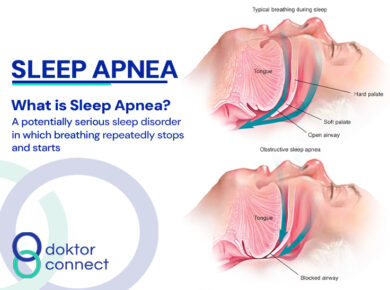Arteries are blood vessels that carry oxygen-rich blood and nutrients from the heart to other parts of the body. Imagine the pipes that supply water at home get occluded, there is a build-up of water just before the occlusion with increased pressure and no water supply to the area after the occlusion. This can be likened to the arteries in the body.
Atherosclerosis is a condition where the arteries become clogged or narrowed due to plaque accumulation. Plaque is made up of cholesterol, fatty substances, cellular waste products, etc. At the initial stage, there are little to no symptoms. However, as the plaque increases and hardens, the walls of the arteries thicken leading to narrowing.
What are the risk factors for a clogged artery?
Modifiable risk factors:
- Smoking
- Physical inactivity
- Obesity
- An unhealthy diet and eating too much salt
- Excess alcohol
Manageable risk factors:
- High blood pressure (hypertension)
- High cholesterol blood level
- Diabetes
- Chronic kidney disease
Unmodifiable risk factors:
- A strong family history of stroke or heart disease
- Male gender
- Increasing age
Warning Signs of Clogged Arteries
Depending on the area the blocked artery supplies, certain symptoms may eventually occur; if the artery supplies a vital organ such as the heart or brain, the blockage can lead to a medical emergency.
Coronary Artery Disease
Symptoms associated with clogged coronary arteries that supply the heart includes:
- Chest pain- When the arteries that supply the heart become blocked, the heart muscle does not receive enough oxygen causing cell death. Moreover, chest pain is a common symptom and may occur in the form of heaviness, tightness, or dull aches. It can also spread to the shoulder or jaw
2. Shortness of breath- When the heart fails to pump blood effectively due to clogged arteries, there is a build-up of blood in the lungs and this can cause shortness of breath.
3. A feeling of indigestion or heartburn- Burning sensation in the chest not relieved after taking antacid medication, maybe a symptom of a heart attack especially in females.
Cerebrovascular disease
When the arteries supplying blood to the brain gets clogged, there is loss of blood supply to that particular part of the brain, and symptoms of a transient ischemic attack or an ischemic stroke can occur such as;
4. Slurred speech
5. Facial drooping
6. Differential weakness in one side of the body
7. Lightheadedness or a temporary loss of consciousness
8. Difficulty in speaking or swallowing
Peripheral Arterial Disease
This is the narrowing of one or more of the arteries that supply mainly the legs. Warning signs include;
9. Calf pain- Especially when you walk because your calf muscles need extra blood and oxygen supply and the pain is relieved on resting
10. Pain in the buttock or thigh- If the iliac artery or aorta becomes clogged, pain may occur in the thighs or buttock when you walk
In severe cases;
11. Cold feet
12. Poor hair growth below the knee
13. Poor toenail growth
14. Weak pulses in the foot
15. Skin ulcers
Erectile dysfunction
16. Inability to attain or sustain an erection- When the blood flow to the penis is clogged, this can lead to erectile dysfunction. Moreover, erectile dysfunction can also serve as a pointer to an underlying cardiovascular disease
Lifestyle changes to prevent clogged arteries
Quit smoking
Lifetime smoking doubles your risk of developing heart disease. The chemicals in tobacco get into the bloodstream from the lungs. They damage the blood vessels (arteries) and other parts of the body. Your risk of having a stroke is also increased.
Eat a healthy diet
A healthy diet helps to control obesity and lowers your cholesterol level. Fruit and vegetables are low in fat and also contain antioxidants and vitamins which may help to prevent the build-up of plaques.
Increase your physical activity
Physically active people have a lower risk of developing cardiovascular disease. You should engage in at least 30 minutes of moderate physical activity e.g brisk walking, cycling, jogging on most days at least five days per week.
Do an annual health check
Check your blood sugar, blood pressure, and cholesterol levels regularly and adhere to doctors advice and/or prescriptions
Doktorconnect has partnered with Lifepro to offer you a comprehensive annual health check which involves a cardiovascular ultrasound scan that checks the thickness of the walls of your carotid arteries, cholesterol level check, blood sugar, blood pressure check, and much more.
Also, if you are experiencing any unusual symptoms, you can speak to a doctor here



